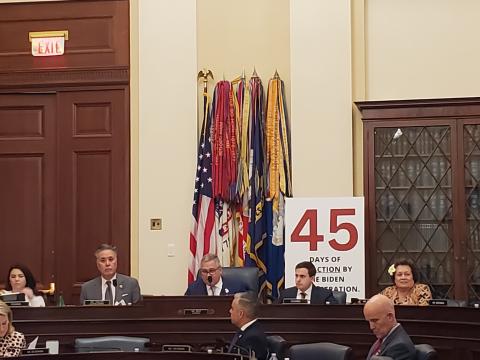Amata Highlights Hearing Examining Services to Remote Veterans
Committee Subpoenas Documents Regarding VA Staff Harassment Allegations
Washington, D.C. – Vice Chairman Uifa’atali Amata is highlighting a Thursday oversight hearing of the Veterans’ Affairs Committee examining efforts of the U.S. Department of Veterans’ Affairs (VA) to serve Veterans in rural or remote locations. The hearing is titled, Rural Access: Is VA Meeting All Veterans Where They Live? A video clip of Amata’s discussion with the witnesses is available HERE.

Amata in VA Committee hearing 11 January 2024
“This is an important topic that relates to the Pacific Islands, as American Samoa has a very high rate of service, and we have many Veterans in the three U.S. territories along with the three Freely Associated States, and others living in the region,” said Vice Chairman Amata. “Nearly one in four Veterans live in rural or remote areas and they face challenges from not being near population centers.”
While rural veterans enroll in VA care at a higher rate than urban veterans, 58 percent have a service-connected condition, 55 percent are seniors, 44 percent earn less than $35,000 yearly, and 27 percent do not have home access to the internet.
The Committee examined VA efforts to provide their access to health care and benefits, and discussed last year’s GAO report, hearing testimony from numerous witnesses on the role of the Office of Rural Health established in 2006, boosting rural telehealth as provided by Congress in the MISSION Act and the CARES Act, challenges to accessing compensation and pension exams, and distance to accessing intensive mental health care.
Chairman Mike Bost said, “The challenges these men and women in rural America face cannot be overstated, which is why others and I fought so hard in 2018 to get the MISSION Act enacted. The MISSION Act and the community care provider network have transformed V.A.’s delivery of healthcare and services – especially in rural and remote parts of the country. But now five years after that bill was signed into law by President Trump, I go home and my veterans are still saying the same thing: I can’t get healthcare and I can’t get my benefits. Whether it’s a limited access to highspeed internet so a veteran can’t make their telehealth appointment, or driving over an hour for routine physical therapy, or an inability to find housing near employment opportunities, or having to travel long distances to attend a disability compensation and pension examination, rural veterans face daunting challenges. V.A. must meet these men and women where they live.”
In other business, the Committee passed a Resolution with a bipartisan vote sending a subpoena to the VA requiring previously requested information and documents to investigate whistleblowers allegations of sexual harassment and misconduct within VA’s Office of Resolution Management, Diversity, and Inclusion (ORMDI).
###